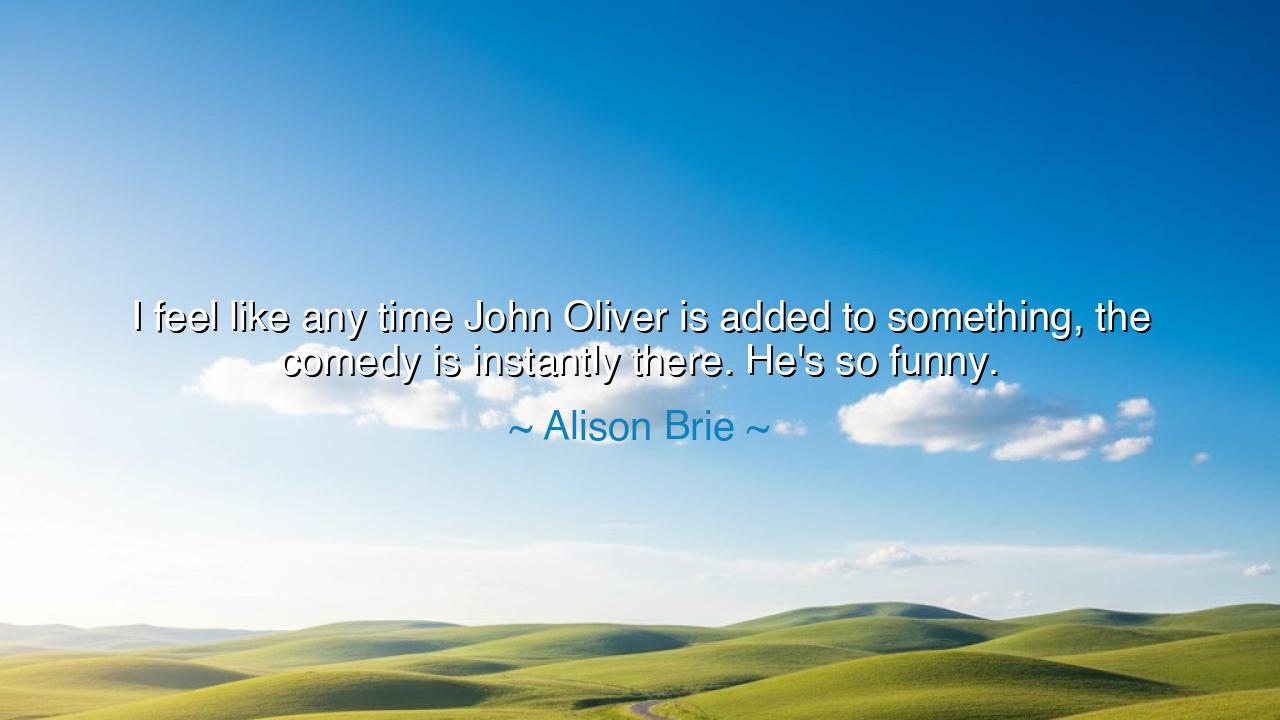
I feel like any time John Oliver is added to something, the
I feel like any time John Oliver is added to something, the comedy is instantly there. He's so funny.






The words, “I feel like any time John Oliver is added to something, the comedy is instantly there. He’s so funny,” were spoken by Alison Brie, the actress known for her wit, warmth, and insight into the alchemy of performance. Though her words appear simple—an expression of admiration for a fellow artist—they conceal a truth far greater than mere praise. Beneath this statement lies an understanding of presence, of how certain individuals carry within them the spark of transformation, the ability to lift the ordinary into brilliance by the mere force of their being. In honoring John Oliver’s humor, Brie also acknowledges the deeper mystery of creative energy—that rare and sacred quality which, when embodied by a person, awakens laughter, truth, and light in others.
To the ancients, such a force would have been called charisma, a divine gift. They believed it was not taught nor earned, but bestowed by the gods—an invisible fire that radiates through word and gesture. When Alison Brie says that “comedy is instantly there” with John Oliver, she speaks of this same fire. For there are people whose presence changes the very atmosphere they enter, as if they carry a torch that ignites those around them. In ancient Greece, this gift was attributed to the muse—the divine spirit that visited poets and performers, granting them the power to make others feel, to see truth clothed in joy. In John Oliver’s craft, humor becomes revelation; through laughter, he reveals the absurdities of the world, making wisdom palatable through wit.
But Brie’s words are not merely about the brilliance of one man—they are a reflection on synergy, the sacred connection between people who create together. In every art, from theater to philosophy, the ancients understood that greatness rarely lives in solitude. The philosopher Socrates needed Plato to record his dialogues; the dramatist Euripides relied on the chorus to give his tragedies voice. So too, in comedy and storytelling, chemistry matters as much as skill. When Brie says that comedy “is instantly there,” she captures the magic of collaboration—the way one person’s energy can awaken another’s, transforming a simple moment into something alive. In this, she reminds us that creativity is not only a personal pursuit but a shared harmony, a symphony of spirits tuned to the same truth.
We can see this reflected throughout history. Consider the partnership of Stan Laurel and Oliver Hardy, whose combined genius became timeless. Separately, they were gifted; together, they were transcendent. Laurel’s innocence balanced Hardy’s bluster, and in their union, laughter was born effortlessly, like air filling a flame. Or think of Richard Pryor and Gene Wilder, whose shared humor broke barriers, revealing through comedy the human struggle for dignity and understanding. Each carried light, but it was the reflection of one upon the other that created brilliance. John Oliver, in Alison Brie’s words, is that kind of catalyst—one who amplifies laughter by his mere inclusion, not through dominance, but through harmony.
In her tone, too, there is reverence for authenticity. “He’s so funny,” she says—not in the contrived sense of performance, but as something intrinsic. True humor, as the ancients would tell us, arises from truth. The comedian who pretends to be clever may amuse for a moment, but the one who reveals reality with courage and clarity—such a one heals through laughter. John Oliver’s comedy, much like that of the wise jesters of old, does not flee from seriousness; it dances with it. His laughter exposes injustice, softens pain, and reminds us that even truth, when seen rightly, can make us smile.
There is also humility in Brie’s reflection. By recognizing another’s gift, she shows the mark of the wise artist—one who understands that greatness shared is greatness multiplied. The ancients believed that envy darkened the spirit, but admiration illuminated it. To celebrate another’s brilliance is to open oneself to its light. Alison Brie’s words remind us to honor the talents of others, to see not competition but communion in creativity. For the artist who acknowledges another’s power grows in their own; the flame that lights another candle does not lose its glow—it doubles its brightness.
So, my child, take this lesson to heart: learn to recognize the bringers of light—those whose presence elevates the room, whose laughter awakens yours, whose truth sharpens your own. Seek them out, work beside them, and let their fire kindle yours. In your own craft, strive not merely to perform, but to be—for presence, not performance, is what truly transforms. Be genuine in your laughter, generous in your praise, and fearless in your collaboration. The world needs more souls who bring comedy and wisdom together, who, like John Oliver, speak truth through joy.
And remember, as Alison Brie’s simple yet profound words remind us: it takes but one bright spirit to change the tone of a gathering, to make the coldest room warm, the heaviest truth bearable, the darkest moment radiant with laughter. Such is the power of presence, and such is the gift of those who carry light into the hearts of others. Seek to be that person—or to honor those who are—and the world around you will forever shine a little brighter.






AAdministratorAdministrator
Welcome, honored guests. Please leave a comment, we will respond soon